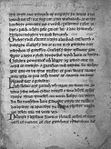Y Gododdin (pronounced [ə ɡɔˈdɔðɪn]) is a medieval poem consisting of a series of elegies to the men of the Britonnic kingdom of Gododdin and its allies who, according to the usual interpretation, died fighting the Angles of Deira and Bernicia at a place named Catraeth. Gododdin held territories in what is now southeast Scotland and Northumberland, part of the Hen Ogledd (Old North). The poem tells how a force of 300 (or 363) picked warriors were assembled, some from as far afield as Pictland and Gwynedd. After a year of feasting at Din Eidyn, now Edinburgh, they attacked Catraeth – usually identified with Catterick, North Yorkshire. After several days of fighting against overwhelming odds, nearly all the warriors were killed.
The poem is traditionally ascribed to the bard Aneirin, and survives only in one manuscript, known as the Book of Aneirin, which is written partly in Middle Welsh orthography and partly in Old Welsh. There is debate among scholars about the date of the poetry: some consider that the original, oral version was composed in the Hen Ogledd – the Brythonic-speaking parts of northern Britain – soon after the battle. The original language of the poem would then have been Cumbric, and the work would be the oldest surviving poem from what is now Scotland. Others believe that it originated in Wales in the 9th or the 10th century, which would make it one of the earliest poems written in a form of Welsh. The manuscript contains several interpolations, one of which may be the earliest known reference to King Arthur.
